
Jacob's Mysterious 'Woman at the Well' Prophecy Revealed
The Woman at the Well event actually begins with an ancient overlooked prophecy in the Book of Genesis. You will only learn about the fruition of this prophecy by reading this paper. I cannot find this revelation on any other site.
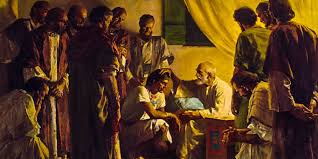
The meeting with the woman starts with an ancient prophecy from the Jewish Patriarch Jacob, the son of Isaac, the grandson of Abraham. Jacob has apparently received a revelation from God that his death is imminent. He calls together his 12 sons at which time he pronounces a series of prophecies concerning each one of them (Genesis 49:1-28). This scene is a shadow of the Bema Seat Judgment of Christ. At that time, a believer is judged according to the fruits of their labors in Christ and rewarded with governance duties during His Millennial Reign on Earth. Jacob’s style of speech is not conversational but poetic, symbolic and at times exclamatory. The gathering of his sons was in a large tent with Jacob sitting on the side of his death bed. It was crowded yet all the brothers maintained a deep hush of reverence and awe at the words Jacob spoke. these pronouncements by Jacob were obviously direct prophetic revelations from God. Some began to dreaded the thoughts of their misdeeds and the effects it would have on their inheritances. Others had great expectations that they would be found worthy to receive an abundance of good fortune.
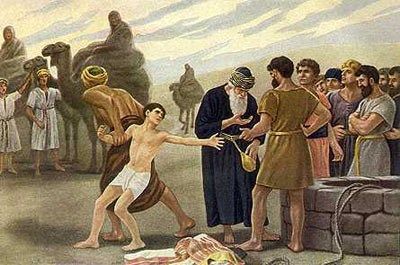
Jacob’s second to last son was Joseph. Many years earlier, his jealous brothers sold him into Egyptian slavery. His brothers told their father he was killed by a wild beast. Joseph would became Pharaoh's Chief Advisor and ultimately reunited with his family. Jacob, on his death bed will pronounce a special blessing for Joseph and the two sons he had by an Egyptian wife. It is important to note that all Biblical scholars agree that the life of Joseph supernaturally parallels the life of Jesus. What was literally done to Joseph would be prophetically done to Jesus. Thus, the life of Joseph was a series of shadow prophecies concerning the life of the coming Messiah.
Jacob states that the tribe of his son Judah will be the progenerators of the future kings of the country. He also states that the rulership of the sons of Judah will not end until the Messiah appears. Jacob refers to the Messiah by the name of Shiloh, and says that under His rulership shall the people follow (Genesis 49:10). He goes on to state that under His rule the land will blossom. This prophecy literally meant that the people of Israel would have prospered under the reign of Christ, but the religious leaders refused the offer. While this prophecy has been delayed, it will be fulfilled at the Second Coming of Christ. Thus, the prophecy refers to a future time when the Messiah will return and the people of the earth will prosper under His rule.
In 6A.D. the priests of the Temple in Jerusalem had been under Roman rule for almost 70 years. They concluded that this prophecy by Jacob which clearly stated that the nation of Judah would not lose its right to self-govern until the Messiah appeared had obviously failed to come to fruition. This meant that the patriarch Jacob had given a false prophecy. This caused the priesthood to mourn by putting on sack cloth, covering their heads in ash and walking the streets of Jerusalem wailing and lamenting that the nation should no longer look for a Savior or Messiah. Little did they know that at that time, an eight year old Jesus was helping his step father in a workshop in the little forgotten village of Nazareth. In other words, salvation was on the way if they would only accept it.

Going down the list, Jacob blesses his son Naphtali whose name means strength, liberty, refined and beauty. The land that Jacob gives to him is a blessing on Jesus and His disciples in that they all came from this land except Judas who came from Judah. Also, the city of Capernaum is located in this land and was the home of Jesus during His ministry.
Now, here is where the prophecy of Jacob concerns Jesus and the woman at the well. As previously stated, Joseph is a shadow prophecy of Jesus. The land that Jacob is giving to the two sons of Joseph is the same land that he himself dug a large well located in Samaria. It was this well that Jesus came to in order to meet with the woman who came originally from Jewish stock but had a perverted theology as it was a mix of Judaism and gentile paganism. Jacob prophesizes that Joseph would be like a well. And this well would produce a fruitful bough by it. And the branches of this bough would run over the wall of the well. This is a shadow prophecy of Jesus sitting on the wall of the well of Jacob, talking to a Samarian woman who represented the theological wall between the Jews and the gentiles. Jesus gives the woman the Living Water of the Holy Spirit at the well. She then runs from the wall of the well and is the first to evangelize the gentiles in the city of Sychar concerning the arrival of the Messiah or King. Scripture tells us that Jesus comes from the bloodline of Judah the tribe of Kings (Matthew 1:1). Then, still prophesying in the Spirit, Jacob states that one like Joseph will have soldiers hate and wound Him. He will be both the Shepherd and the stumbling Stone of Israel. He goes on to say that God will give Him all blessings in Heaven and on earth. And ultimately, He would wear a crown on His head even though He was separated from his brothers (Genesis 49:22-26). (Please see related paper: “Joseph & Jesus: Twin Sons of Different Mothers”) Now let’s take a closer look at how and why Jesus satisfied this ancient prophecy.
There were several occasions during the ministry of Jesus when He traveled to certain places that were forbidden for a respected Rabbi to visit. The story of Jesus meeting with the woman at the well is one of these times. To understand how unorthodox this meeting was, we need to consider a number of issues including the location of the well, who dug the well, the ancient prophecy given concerning the well, the woman at the well, the ensuing conversation Jesus had with her, His startling announcement to her and finally, the 180 degree turn this announcement had on her, the townspeople and His disciples.
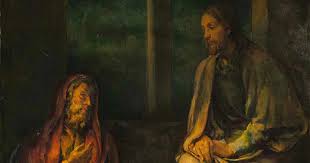
The Gospel of John tells us in chapter three that while Jesus was in Jerusalem teaching, a Pharisee by the name of Nicodemus came secretly in the night to talk with Him. He was a greatly respected Jewish theologian, a member of the Sanhedrin the ruling body of Israel, and one of the wealthiest men in Jerusalem. Jesus explained to Nicodemus the need to be born again in the Holy Spirit. He also told him that He was sent from Heaven, that He would be crucified, He would bring salvation to mankind, and that the incorrigibly wicked would receive an afterlife of condemnation. Nicodemus went away theologically challenged by all that Jesus had told Him. Eventually, Nicodemus decided to secretly become a follower of Jesus. And, it may have been that Jesus secretly met with Nicodemus to arrange His temporary burial (John 19:39).
Jesus was then led by the Holy Spirit to travel north from the land of Judah to the region known as the Galilee (John 3:22; John 4:1-3). Jesus decide to take the most direct route which was through the land of Samaria. Scripture simply states, “And He must needs go through Samaria.” (John 4:4) Literally, the words must needs means that it was convenient for Jesus to take this route as it would cut three days off the trip. But figuratively the words mean that Jesus must go through Samaria as He needs or is required to take this route in order to meet a certain woman. And this meeting is prophetic as it was given by the patriarch Jacob 1,800 years earlier. So, Jesus must make this trip into this particular land because He needs to have a meeting in order to satisfy Jacob’s prophecy.
The people of Samaria had what the Jews of Judah considered to be a sorted past. In 722 B.C., the Assyrians conquered the land of Judah and exiled thirty thousand Jews in the region of Samaria to other parts of the kingdom. They replaced them with gentiles from other newly conquered lands. In this way, the culture of a people was destroyed and replaced by the pluralistic Assyrian culture. This also helped to stop nationalistic based uprisings. The remaining Jews of Samaria married the Assyrian supplied gentiles and produced offspring. They even built their own temple to replace the one in Jerusalem. There they prayed to five different gods. When the Jews returned to Judah from exile, they were horrified at the lack of discipline and reverence to God the Sumerians now displayed. For the Jews, the Sumerians had been degraded to the status of a mongrel race of people unfit to be called Jews, and allowed to worship in the Temple at Jerusalem. It was then that the Jewish leaders officially declared Samarians as unclean and forbid Jews to marry, trade or even travel to the land of Samaria.
So, for Jesus to travel through Samaria broke with a hard kept Jewish tradition. Next, He would meet and talk alone with a Sumerian woman. It was against Jewish law for a rabbi to talk with any woman in public including his wife and daughter. So, now we know that Jesus was neither racist, sexist nor followed any tradition that oppressed or degraded others.

Jesus and His disciples arrived just outside the city of Sychar at high noon. And being tired from the journey, He sat down on the upper retaining wall of the well. While Jesus was born and lived a life without sin, He experienced the same physical weaknesses of being fully human as do all people. So, Jesus was both fully human while at the same time being fully divine (Hebrews 4:15). It is interesting to note that Jesus never used His divine powers to help Himself physically when it came to being thirsty, hungry or tired. He apparently wanted to feel everything that all humans feel.
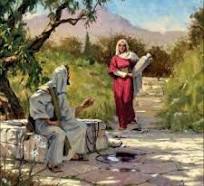
Jesus sat down at the well knowing that He was destined by prophecy to meet a certain woman who was on her way to get water for the day. He sent His disciples into the city to buy food. This would also allow Him the alone time He would need with the woman. Jesus wanted to meet with her alone because He was about to conduct a highly personal intervention. So, He did not want to embarrass her in front of others. As the disciples left the well, they no doubt passed the woman who is completely unaware that she was about to experience the lifechanging event for which she had long prayed.
For the woman to be alone and drawing water out of the well at noon would strongly suggest that she had become a social outcast. Women were responsible for all domestic chores including collecting water, firewood and bartering for food. Fresh water was traditionally collected at sunrise, and if necessary, a second time just before supper at sunset. This was also a time when the women of the city could catch up on news. Thus, the woman in question apparently made an effort to not be in the vicinity of the well when other women were present.
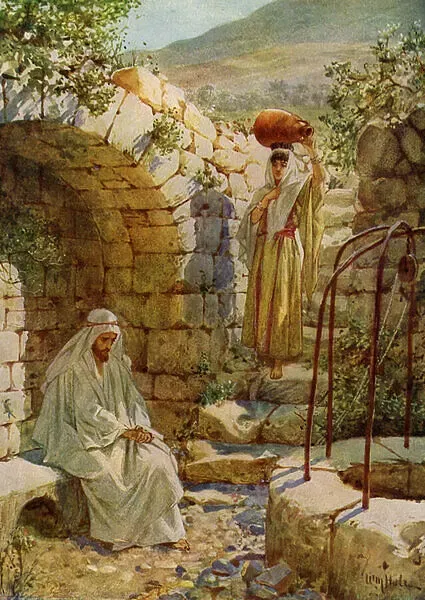
The woman was not expecting Jesus but He was expecting her. Nicodemus, a most respected Jew came to Jesus secretly by night and had a life changing experience. The woman, a most disrespected gentile woman came to Jesus in broad daylight and would have the same lifechanging experience. The woman walks up to the well where Jesus is sitting, attaches her container to a rope and lowers it down into the water. As she pulls up the container now overflowing with fresh spring water, Jesus says to her, “…,Give Me a drink.” (John 4:7-8). The woman is startled not so much at the request but by who has made the request. Now begins the longest single conversation by Jesus as recorded in the Gospel of John. Jesus will speak seven times which is the number of completion, and the woman will speak six times which is the number of mankind. Jesus would initiate and conclude this conversation.
The woman first asks Jesus how is it that He, obviously a Jew, would ask her as a Samarian woman to give Him a drink. After all, the Jews have no dealings with the Samarians as they are a mix of Jews and Gentiles and so, despised by both factions. Literally, the woman could not give Jesus water due to prevailing Jewish customs that did not allow them to drink from anything owned by a Samaritan. Jesus answers the woman by ignoring the ridiculous and petty prejudices between the Jews and Samarians and says, if you only knew the spiritual gift of salvation that God is right this minute offering you, and who I am that has asked you to give me a drink for my physical thirst, you would have instead asked me for a drink. And I would have granted your request by giving you Living Water to eternally satisfy your spiritual thirst. The woman was currently attempting to satisfy her spiritual thirst by depending on physical male companionship (John 4:10). This spiritual offer is very confusing to a cultural, non practicing Jew, living a physical day by day lifestyle. She would have no context in which to make the psychological leap from physical water to a discussion concerning spiritual water. Nicodemus showed that he too was initially unable to make this leap even with his substantial theological background. Jesus uses the phrase “gift of God” only here but it has become a vital part of modern Christian vocabulary. This gift of God is the power of the Holy Spirit that can indwell a believer and provide encouragement and direction in life while insuring eternal life after death. It is a gift because a person cannot earn it through works of the flesh such as trying to follow the Law of Moses. Physical water is required regularly throughout the day as a person constantly thirsts. But Living Water eternally quenches a person’s spiritual thirst by establishing a personal relationship with their Creator God.
Jesus will be referred to as the Word of God and Bread of Life but never as Living Water. Only the Holy Spirt is referred to as Living Water(s) just as only Jesus is referred to as the Word of God (John 1:1). Jesus would send the Holy Spirit to indwell His followers ten days after His ascension and during the Jewish Feast of Pentecost. This feast originally commemorated the giving of the Law on Mount Sinai. But sadly that very same day, three thousand Jews were killed for not keeping the Law (Exodus 32:28). This feast was always only a shadow of the true celebration to come. The prophetic or actual Pentecost celebration occurred May of 33 A.D. It was then that the Holy Spirit arrived to permanently indwell all believers. This first mass indwelling involved three thousand Jews who heard the Gospel from Peter, believed in Jesus as Messiah and were baptized. Thus, this event is seen by most Biblical scholars as the official beginning of the Church Age of Grace and Mercy (Acts 2:41; John 14:16).
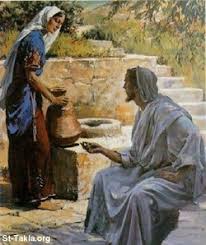
The woman then asked Jesus why He had come to a well with nothing to draw up water with. The woman was literally talking about His inability to draw up actual water from the well as it was deep and He had no pail. She knew it was against Jewish purity law for a Jew to drink from anything that was owned by a Samaritan. Jesus was figuratively talking to her about His ability to draw down unlimited spiritual water from Heaven.
She now address Jesus as “sir” showing respect for the first time. She questions that since He obviously cannot draw up water from the well as He has come unprepared, He must be talking about a different type of water that He refers to as Living Water. She then asks Him from where does He get this so called Living Water (John 4:11)? She also asks Jesus if He was implying that He was greater than “father Jacob” in that He could provide a better grade of water than that of Jacob? After all, Jacob actually dug down one hundred feet through solid limestone to create a massive well seven feet across. And, not only did he, his twelve sons and all their livestock drink from the well, but the well had continue to provide fresh life sustaining water for the past 1,800 years (Genesis 33:19). Her emphasis had always been on Jacob concerning birth legitimacy, spiritual access legitimacy, land ownership legitimacy and legitimacy concerning ownership to a well that brought life to many Samaritans. Jesus will now draw her away from this single focused mindset without denigrating the patriarch Jacob.
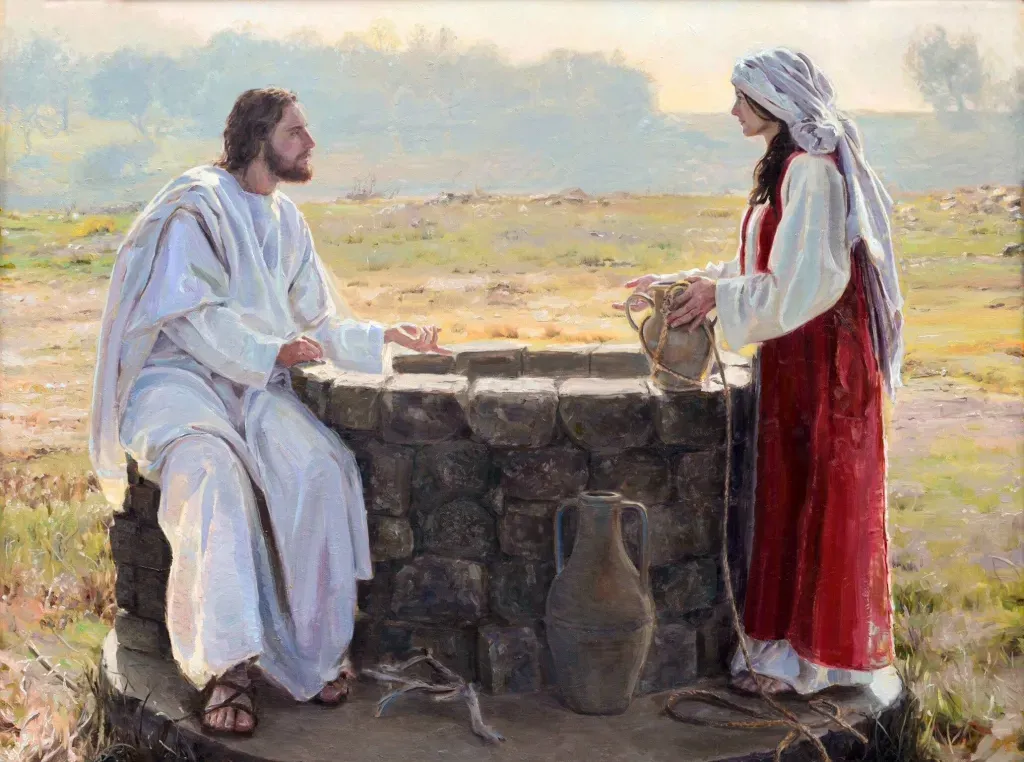
Jesus begins to explain to the woman that whoever drinks the water from Jacob's well, will eventually become thirsty again. Literally this is obviously true, but figuratively Jesus is telling her that if she or anyone continues in the ways of Jacob, father of the twelve tribes of Judah now under Mosaic Law, they will never have their minds eased and their spiritual thirsts quenched. She will always find herself in a spiritual state of loneliness longing for relief (John 4:13). However, anyone who receives Living Water that only He can give them, will never spiritually thirst again. This is because the Living Water of the Holy Spirit flows from an internal and eternal spiritual fountain which provides literally the Peace of God and prophetically Everlasting Life (John 4:14).
The woman now understands that Jesus is talking about the possibility of a mystical change that would cause her to experience peace of mind. So she now makes a request which allows Jesus, a rabbi under the Law, the ability to legally ask her as a gentile woman a question. She says to Jesus that she wants this internal change so that her external need does not drive her back and forth endlessly in a degrading routine of work, public ridicule and failure (John 4:15). Jesus tells her to first go to her husband who has caused them both to sin, and bring him back to the well. This request by Jesus will now cause her to confess both the issue of her sin of fornication and possibly adultery, and confront the root cause of her constant uneasy internal longings. The woman answers by saying that she has no husband, but does not say if the man she was living with had a wife. Jesus thanks her for being honest with him and confessing their sins. The first step in the salvation process is for a person to recognize and confess that they are a sinner. Jesus then gently reminds the woman that she has had five husbands, and the man she was now living with was only a common law lover. This means she had endured five failed marriages, five divorces and was on her way to number six.
Jesus is saying to the woman and us that He knows all her and our faults which are many. And yet, He still loves her and us in spite of herself. Jesus loves a person unconditionally and therefore a person can in turn love God unconditionally. Jesus said that He did not come into a sinful world to condemn it. Instead, He came to create a way for mankind to receive redemption from sin and eternal life (John 3:17; 12:47). The woman was unknowingly about to become a bride of Christ and Jesus would become her seventh and final groom.
The woman now realizes that she is not talking to just any Jew but a prophet as He knew her past and present situations (John 4:19). The Samarians only recognized two prophets. One was Moses and the other was a future one which Moses prophesied would one day appear (Deuteronomy 18:18). So, it may be that the woman suspects that the prophet she is talking to might be the prophet of which Moses spoke. The woman now changes the subject for two reasons. First, she wanted to get the focus of their conversation off her illicit affairs and does not want to go and bring her current lover to meet with Jesus. Second, as a prophet, Jesus would be the perfect person to ask a burning issue she has been considering for a long time. So, she asks Jesus this question concerning the place where she worships as a Samarian as opposed to the place where He worships as a Jew.

The Samarians worshiped in a temple located on Mount Gerizim fifty miles north of Jerusalem. They chose this location because Abraham and Jacob had worshiped on the mountain (Genesis 12:7; 33:20). The Jewish historian Flavius Josephus states that the Samarians trace their ancestry to Jacob by way of Joseph and his two sons Ephraim and Manasseh. The Samarians broke away from the Temple system of Jerusalem and built their own temple in 450B.C. The Maccabees would later tear it down in 110B.C.
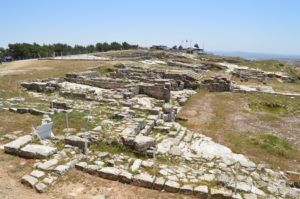
The woman had been taught that because she was related to Jacob, lived on land owned by Jacob, drank the water of Jacob and worshiped on the mountain that Jacob worshipped on, she had a more legitimate connection with God through the patriarch than the Jews in Jerusalem. But now doubt was starting to creep into her thinking. She apparently suspects that it might be her place of worship that has kept her from realizing a better life. In other words, if she worships in the wrong place, then God cannot hear her and this would explain why her prayers were never answered.
Both Nicodemus and the woman met with Jesus initially believing they were in good graces with God. They were both the seeds of Abraham, they considered themselves as Jews, and generally followed the Laws of Moses as best they could. Yet, they felt an emptiness that God was not fully vested in them. Nicodemus listened to Jesus preach in the Temple, but had trouble rectifying his God of laws, judgement and punishment with Jesus’ idea of a loving Father offering grace, mercy, forgiveness and eternal life. It was as if he and Jesus were worshiping two different Gods. The real issue was that Nicodemus was worshipping the God who created a covenant of Law with Moses and the children of Israel. Jesus was teaching about the same God, but who was now about to create a new covenant by way of the self sacrifice of Christ. This new covenant of grace and mercy was based on a person being reborn not of the flesh but of the Holy Spirit. This then allowed the worshiper a superior relationship with God. So, we have one God but two completely different covenant agreements. One offered the possibility of salvation through strict adherence to the physical works of the Law. The other was guaranteed salvation through faith and nothing else. Although, there is an expectation that faith will produce good works as a biproduct. Nicodemus was working hard, going physically back and forth from the Temple trying to keep the 613 Laws yet always felt spiritually empty. The woman was working hard going physically back and forth from the well trying to keep her current man happy yet always feeling spiritually empty. Jesus made them both aware that the root cause of their emptiness was that they were lacking the spiritual fundamental necessary to obtain a fulfilling relationship with God. Jesus could never teach the Pharisees because they were so self-righteous that they did not feel they needed to be helped. When in fact, only Jesus can reconcile mankind to a righteous God (II Corinthians 5:19-20; I Timothy 2:5; Colossians 1:19-20).
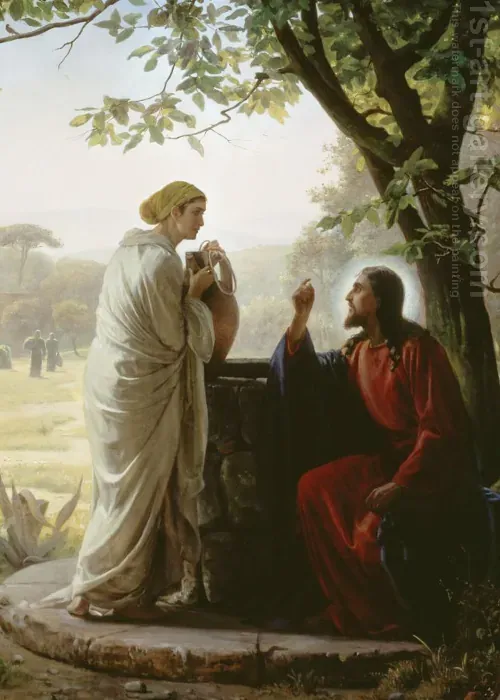
Jesus tells the woman that the only legitimate Temple in the eyes of God is the one located in Jerusalem. This answer was no doubt very upsetting news for the woman who now needed to consider how she could best right this wrong. But, before she could respond to Jesus, He said to her, "... listen carefully to what I am about to say to you. The time is coming {after His crucifixion and resurrection} when you will no longer need to only worship the Father on this mountain nor in Jerusalem". Jesus was prophesying once again concerning the coming destruction of Jerusalem and the Temple. This would occur in 70 A.D. which was exactly forty years after the beginning of Jesus’ ministry. Jesus went on to say that the Samarian’s spiritual problem was not so much where they were praying but because they did not know who they were worshiping. Thus, their worship held no validity with God. The Jews, on the other hand, worshiped God the Father who would provide salvation by way of the Messiah. But, they were also spiritually blind and were in the process of rejecting their long awaited Messiah. So, the actual physical place of worship and failing to keep the law were soon to be non-issues.
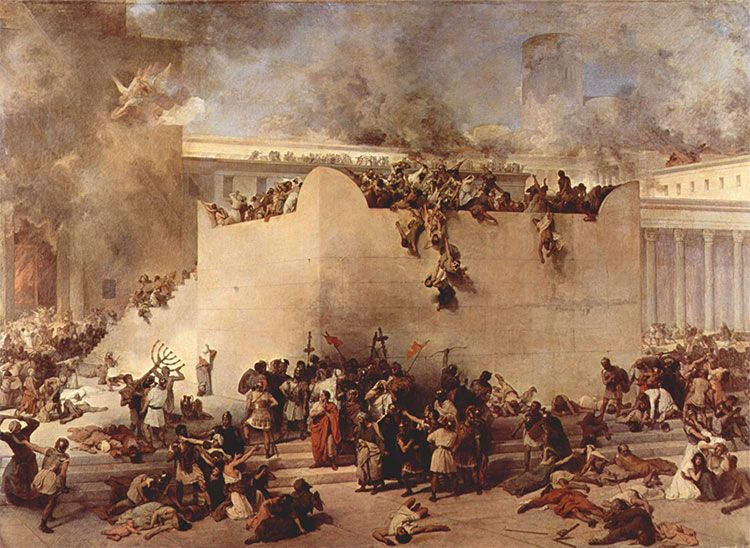
The mission of the Messiah was to replace the Law with a new more perfect Everlasting Covenant based on grace plus nothing else. God will then allow the Romans to destroy the Temple in Jerusalem, thus ending the Mosaic sacrificial system as Jesus was the perfect and final prophesied sacrifice. The Jews would then be forcibly dispersed by the Romans on behalf of God throughout the world, and the Church Age would now be revealed and available to both the Jews and gentiles. This new system of true worship would not be based on law, sacrifices and meaningless rituals and customs. Instead, it will be based purely on worship of the Father in spirit and in truth. Without an engaged spirit of devotion towards the Father, there can be no true worship of the Father. And, the Father is now only interested in this type of worshiper. Jesus goes on to explain that God is a Spirit being or entity so, in order to worship Him correctly, a follower must worship Him in spirit and with true devotion in their heart (John 4:20-24). Jesus is pointing out the difference between a religion and the Gospel or Good News. Religion is a word that describes mankind’s search for God. But Gospel is a word that describes God reaching out to mankind with a good news offer of forgiveness and eternal life.
God never hears the prayer of a sinner who is only praying in the moment and not with sincere repentance in their heart. God always hears the prayer of a repentant sinner who is looking for forgiveness and salvation. God answers this prayer by having the Holy Spirit indwell the person. Only then can a person pray and worship God in spirit and in truth. A person now has a direct link to God who hears all the persons prayers and answers them in His own time and in His own way. This means that all religions that rely on laws and customs were replaced by the implementation of a new more perfect way of worshiping God in spirit through faith in Christ.
To put this another way, the only guaranteed way to eternal life is through faith in Christ. However, Jesus said that the only way to the Father was by Him (John 14:6). So, Jesus is clear that He alone will decided a person’s eternal state based on His own criteria. Faith in Christ guarantees salvation. Following any other religion is taking a big unnecessary chance. Eternal salvation is far too important a decision on which to roll the dice! The woman now understands the reason why her prayers have not been answered by God.
The woman had also been taught that when the Messiah or Anointed One of God arrives, all the problems of mankind will be resolved and all questions will be answered (John 4:25). She is now starting to believe that Jesus may very well be the Messiah but is not completely sure as were the disciples and most of His followers at this time.
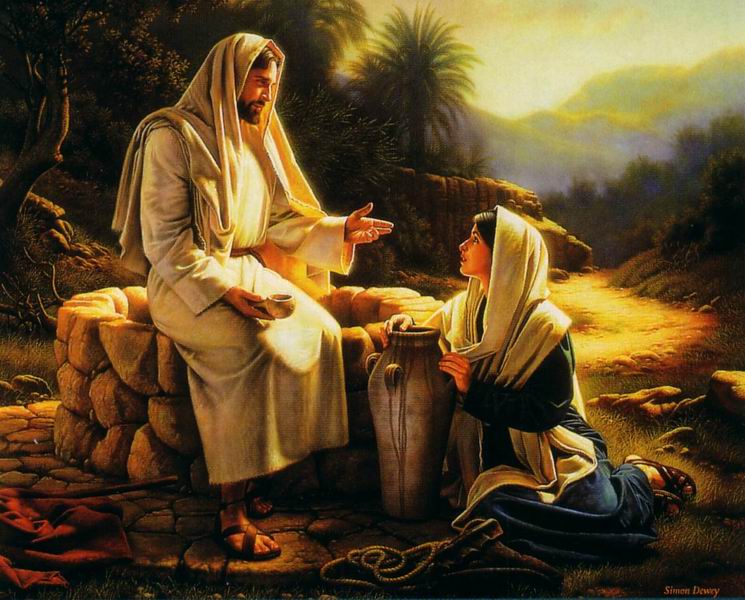
Jesus, knowing her desire to see the coming of the Messiah, looks the woman straight in the eyes and in a calm voice says, “I who is speaking to you am He.” (John 4:26) Jesus could have said this to Nicodemus, but he was not ready to accept this statement. Instead, he was theologically engrossed in contemplating what Jesus had just told him concerning being born in the Spirit. He also had a stellar reputation at that time as a religious leader and felt he could not tarnish it by being seen as a follower of Jesus. Thus, Nicodemus arrived spiritually bold yet blind, talked with Jesus who planted a seed and left spiritually shaken. The idea of being saved through faith plus nothing else literally stupefied him. Yet he knew that this was the original foundational belief of all the patriarchs before Moses and the giving of the Law at Mount Sinai (Genesis 15:6).

It was at this exact moment that the disciples arrived back at the well with food. They had no idea what had just transpired. They were only concerned that, as they approached the well, they saw Jesus a revered rabbi talking to a gentile Samarian women alone. Still, not one of them questioned the woman concerning what she wanted with Jesus nor Jesus as to why He would lower Himself to talk with her (John 4:27).
The woman, now knowing who Jesus was and the gift He had given her from God, had been reborn in the spirit. She now understood the secret of life which is obtaining and growing a true spiritual relationship with God. Their conversation had now come full circle. Jesus had asked her for some water and she could not supply His request. He had the ability to give her Living Water but she was spiritually blind. Jesus opened her eyes to her current situation, she asked Him for this water and was immediately indwelled by the Holy Spirit. Within only minutes, she had gone from seeing Jesus as a Jewish stranger to His becoming her friend, confidant, therapist and spiritual leader. He had quenched her spiritual thirst with Living Water. She understood who Jesus was and her prayers had been answered. She finally had peace of mind as she was now right with God.

She immediately left her water pot and ran back into the city to spread the word and evangelize the people about Jesus. She was now literally the first person Jesus told that He was the Messiah. She was also literally the vine that grew over the wall {of the well} that Jacob had prophesied about one thousand eight hundred years earlier (Genesis 49:22). Figuratively, she realized she no longer needed to continue carrying the daily weight of the laws and customs that had failed her for so long. Now she understood that she had obtained the love of God and salvation through grace. She now had a spring of Living Water bubbling up insides her. She said to the city leaders, “Come and see a Man who told me all the things I have done in my past: is this not the Messiah?” (John4:29) This is reminiscent of the exact same event that happened to the disciple Nathanael sitting under a fig tree (John 1:48).
Jesus had quoted the Old Testament to the Jewish scholar Nicodemus who had admitted that Jesus was sent from God. But, but as an academic, he only understood the law and customs and was unable to comprehend the things of the heart and spirit. This is why Jesus said to him, “… I have spoken to you of earthly things and you do not believe; how then will you believe if I speak of heavenly things.”(John 3:12-13) The sinful uneducated gentile woman was not quoted scripture but instead asked only three pointed questions, “You ask me for a drink?”, “Where can You get Living Water” and “Are You greater than Jacob?” Yet she quickly understood who Jesus was, accepted what He was preaching and ran to evangelize the people of her city. The news concerning the arrival of the Messiah quickly spread and the people began to stream out of the city towards the well. It seems this mix of Jew and gentile was quick to realize who Jesus was because they were not as incumbered or blinded by a host of useless rituals and traditions. They approached Jesus with an open mind, considered what He preached and believed.
In the meantime the disciples urged Jesus to eat the food they had purchased. But Jesus told them that He now had a type of nourishment of which they were not yet aware. Jesus had just fed a pagan gentile sinner the Gospel and caused her to be born again and have eternal life. This understanding was food for His spirit. In other words, when a person is saved and glorifies God, Jesus is rejuvenated. When the lost are found, and the down trodden receive hope, Jesus derives strength. Jesus tells His disciples that He is sustained spiritually when He accomplishes the will of His Father who sent Him. He will finish His mission by self sacrificing Himself on the cross for the remission of the sins of mankind (John 4: 30-34).

Jesus then looks at the approaching crowds and explains to His disciples that mankind is desperately searching for truth and peace of mind, and therefore ripe for receiving the Gospel (Matthew 9:37). Jesus met with one woman who was an outcast from society. And within minutes, she has been saved and now caused an entire city the opportunity to be saved. One seed was sown and immediately there was a large harvest to reap. It takes a person who sows in order for another to reap the harvest. But both people will receive a reward for their efforts. Literally people are saved, but prophetically these people will also receive rewards of governance during the Millennial Reign of Christ and eternal life.
The story ends with the people asking Jesus to stay and teach them more about His Good News. Jesus stayed with them for two days. Many, but not all of the Sumerians, came to believe that Jesus was the Messiah. They reached this conclusion after hearing the story of the woman and listening to Jesus preach (John 4:39-42). Scripture does not mention Jesus performing any miracles for this Jewish-gentile population. Also, for Jesus to have stayed in a Samarian town and preached to the people would have broken many Jewish purity laws and customs.

On an prophetic note, some scholars believe that Jesus staying with the gentiles for two days is a prophecy concerning the duration of the Church Age. We read in Second Peter that, “one day with the Lord is as a thousand years … {on Earth}” (II Peter3:8). Therefore, His two day stay may be a hidden prophecy that the Church Age will last two thousand years and end with the rapture of the Church. The Church Age began with the arrival of the Holy Spirit on the Feast of Pentecost May 24th, 33A.D.
On a closing note, Jesus would only provide healings for two gentiles during His 3.5 year {40 month} ministry. He healed the servant of a Roman centurion because the centurion had blessed Israel (Luke 7:4-5). And, He healed a Syrophoenician {Canaanite} woman who had a sick daughter. He did this because she received a word from God and responded to it in faith (Matthew 15:21-28).
If you enjoy the information provided on this site, please consider making a donation of any amount to help continue its production. Donate Now